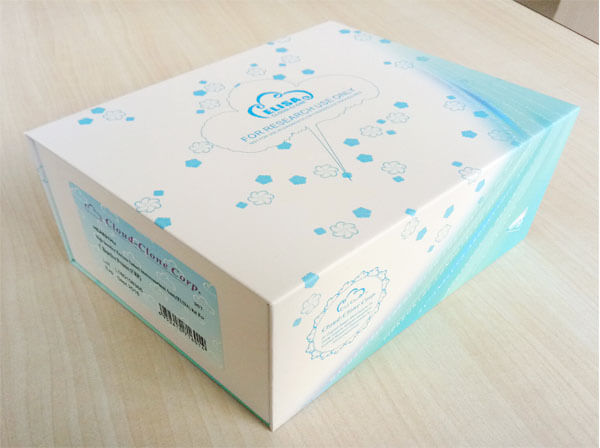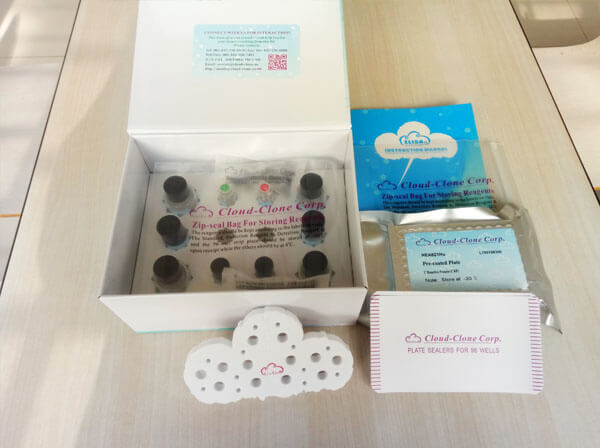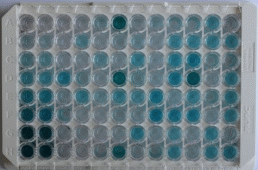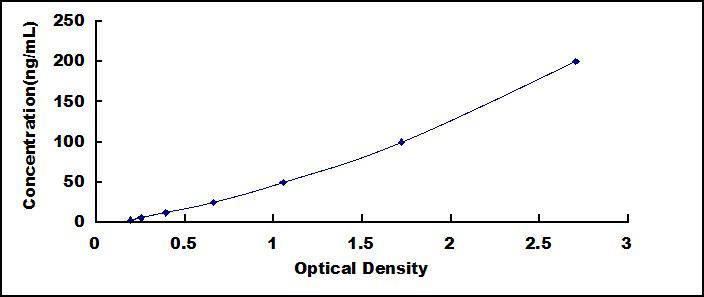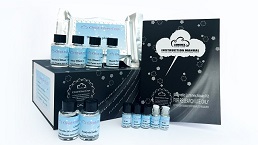ELISA Kit for Anti-Glucagon Like Peptide 1 Antibody (Anti-GLP1) 

- UOM
- FOB US$ 613.00 US$ 875.00 US$ 3,938.00 US$ 7,438.00 US$ 61,250.00
- Quantity
Overview
Properties
- Product No.AEA804Ra
- Organism SpeciesRattus norvegicus (Rat) Same name, Different species.
- ApplicationsEnzyme-linked immunosorbent assay for Antibody Detection.
Research use only - DownloadInstruction Manual
- CategoryEndocrinologyCardiovascular biologyHepatologyHormone metabolism
Sign into your account
Share a new citation as an author
Upload your experimental result
Review

Contact us
Please fill in the blank.
Recovery
Matrices listed below were spiked with certain level of Anti-Glucagon Like Peptide 1 Antibody (Anti-GLP1) and the recovery rates were calculated by comparing the measured value to the expected amount of Anti-Glucagon Like Peptide 1 Antibody (Anti-GLP1) in samples.
| Matrix | Recovery range (%) | Average(%) |
| serum(n=5) | 87-102 | 96 |
| EDTA plasma(n=5) | 83-101 | 91 |
| heparin plasma(n=5) | 80-90 | 84 |
Precision
Intra-assay Precision (Precision within an assay): 3 samples with low, middle and high level Anti-Glucagon Like Peptide 1 Antibody (Anti-GLP1) were tested 20 times on one plate, respectively.
Inter-assay Precision (Precision between assays): 3 samples with low, middle and high level Anti-Glucagon Like Peptide 1 Antibody (Anti-GLP1) were tested on 3 different plates, 8 replicates in each plate.
CV(%) = SD/meanX100
Intra-Assay: CV<10%
Inter-Assay: CV<12%
Linearity
The linearity of the kit was assayed by testing samples spiked with appropriate concentration of Anti-Glucagon Like Peptide 1 Antibody (Anti-GLP1) and their serial dilutions. The results were demonstrated by the percentage of calculated concentration to the expected.
| Sample | 1:2 | 1:4 | 1:8 | 1:16 |
| serum(n=5) | 78-102% | 85-101% | 85-101% | 80-89% |
| EDTA plasma(n=5) | 85-101% | 89-101% | 86-101% | 78-90% |
| heparin plasma(n=5) | 90-104% | 87-104% | 97-105% | 78-101% |
Stability
The stability of kit is determined by the loss rate of activity. The loss rate of this kit is less than 5% within the expiration date under appropriate storage condition.
To minimize extra influence on the performance, operation procedures and lab conditions, especially room temperature, air humidity, incubator temperature should be strictly controlled. It is also strongly suggested that the whole assay is performed by the same operator from the beginning to the end.
Reagents and materials provided
| Reagents | Quantity | Reagents | Quantity |
| Pre-coated, ready to use 96-well strip plate | 1 | Plate sealer for 96 wells | 4 |
| Standard | 2 | Standard Diluent | 1×20mL |
| Detection Reagent A | 1×120µL | Assay Diluent A | 1×12mL |
| TMB Substrate | 1×9mL | Stop Solution | 1×6mL |
| Wash Buffer (30 × concentrate) | 1×20mL | Instruction manual | 1 |
Assay procedure summary
1. Prepare all reagents, samples and standards;
2. Add 100µL standard or sample to each well. Incubate 1 hours at 37°C;
3. Aspirate and add 100µL prepared Detection Reagent A. Incubate 1 hour at 37°C;
4. Aspirate and wash 5 times;
5. Add 90µL Substrate Solution. Incubate 10-20 minutes at 37°C;
6. Add 50µL Stop Solution. Read at 450nm immediately.

Test principle
The microtiter plate provided in this kit has been pre-coated with an antigen. Standards or samples are then added to the appropriate microtiter plate wells with a Horseradish Peroxidase (HRP)-conjugated secondary antibody. After TMB substrate solution is added, those wells that contain Anti-Glucagon Like Peptide 1 Antibody (Anti-GLP1) will exhibit a change in color. The enzyme-substrate reaction is terminated by the addition of sulphuric acid solution and the color change is measured spectrophotometrically at a wavelength of 450nm ± 10nm. The concentration of Anti-Glucagon Like Peptide 1 Antibody (Anti-GLP1) in the samples is then determined by comparing the O.D. of the samples to the standard curve.
Giveaways
Increment services
Citations
- Specificity and sensitivity of commercially available assays for glucagon‐like peptide‐1 (GLP‐1): implications for GLP‐1 measurements in clinical studiesPubmed:25041349
- Expression of cholecystokinin2-receptor in rat and human L cells and the stimulation of glucagon-like peptide-1 secretion by gastrin treatmentPubmed:25601282
- Inhibitory effect of somatostatin on insulin secretion is not mediated via the CNSPubmed:25630331
- Effect of Sleeve Gastrectomy Plus Side-to-Side Jejunoileal Anastomosis for Type 2 Diabetes Control in an Obese Rat ModelPubMed: 26202420
- Anti-hiperglycemic Effect of Urena lobata Leaf Extract by Inhibition of Dipeptidyl Peptidase IV (DPP-IV) on Diabetic RatsPdf: 7
- Subcutaneous administration of liraglutide ameliorates learning and memory impairment by modulating tau hyperphosphorylation via the glycogen synthase kinase-3尾 pathway in an amyloid 尾 protein induced alzheimer disease mouse modelPubmed:27131827
- miR-200a reCavia (Guinea pig )lates Rheb-mediated amelioration of insulin resistance after duodenal-jejunal bypassPubmed:27121251
- Incretin effect of Urena lobata leaves extract on structure and function of rats islet β-cellsS2225411016302802
- Alterations in gut microbiota during remission and recurrence of diabetes after duodenal-jejunal bypass in ratspubmed:27547013
- Effects of sleeve gastrectomy with jejuno-jejunal or jejuno-ileal loop onglycolipid metabolism in diabetic rats.pubmed:27621579
- Improvement in glucose tolerance and insulin sensitivity by probiotic strains of Indian gut originin high-fat diet-fed C57BL/6J mice.pubmed:27757592
- Incretin effect of Urena lobata leaves extract on structure and function of rats islet b-cellsd69b5594c032d557c3f3203b91aba2604a94
- Deactivation of the NLRP3 inflammasome in infiltrating macrophages by duodenal-jejunal bypass surgery mediates improvement of beta cell function in type 2 diabetes10.1016/j.metabol.2017.10.015
- The Effects of Duodenojejunal Omega Switch in Combination with High-Fat Diet and Control Diet on Incretins, Body Weight, and Glucose Tolerance in Sprague-Dawley Rats.pubmed:28840471
- Selective Vagotomy Worsens Glucose Control After Ileal TranspositionPubmed:29525935
- Preserving Duodenal-Jejunal (Foregut) Transit Does Not Impair Glucose Tolerance and Diabetes Remission Following Gastric Bypass in Type 2 Diabetes Sprague …Pubmed:29098544
- Ileal Transposition Surgery Decreases Fat Mass and Improves Glucose Metabolism in Diabetic GK Rats: Possible Involvement of FGF21Pubmed:29593555
- Downregulation of lncRNA MALAT1 contributes to renal functional improvement after duodenal-jejunal bypass in a diabetic rat modelPubmed:29781038
- Deactivation of the NLRP3 inflammasome in infiltrating macrophages by duodenal-jejunal bypass surgery mediates improvement of beta cell function in type 2 …Pubmed:29129820
- Effects of Diet-Induced Early-Stage Obesity on a Low-Testosterone Gottingen Minipig
- The influence of high fat diet on plasma incretins and insulin concentrations in Sprague-Dawley rats with diet-induced obesity and glucose intolerance undergoing …Doi: 10.1016/j.peptides.2019.04.001
- Grape Seed Proanthocyanidin Affects Lipid Metabolism via Changing Gut Microflora and Enhancing Propionate Production in Weaned PigsPubmed: 31175811
- Alcohol Withdrawal and Proopiomelanocortin Neuropeptides in an Animal Model of Alcohol DependencePubmed: 31117084
- The Leading Role of Peptide Tyrosine Tyrosine in Glycemic Control After Roux-en-Y Gastric Bypass in RatsPubmed: 31701411
- Novel GPR120 agonist TUG891 modulates fat taste perception and preference and activates tongue-brain-gut axis in micePubmed: 31806728
- Metabolik sendromlu sıçanlarda yüzme egzersizinin plazma glukagon-benzeri PEPTİD-1 (GLP-1) seviyesi ve hipokampal GLP-1 reseptörü üzerine etkisinin …
- Effect of oligofructose on resistance to postoperative high-fat diet-induced damage of metabolism in diabetic rats after sleeve gastrectomy33889290
- Study on the Therapeutic Effects of Traditional Chinese Medicine on Insulin Resistance in Obese Mice by Modulating Intestinal Function
- Central GLP-1 contributes to improved cognitive function and brain glucose uptake after duodenum-jejunum bypass on obese and diabetic rats34370593
- The effect of bariatric surgery on the expression of Growth Differentiation Factor-15/Macrophage-Inhibitory Cytokine-1 (GDF-15/MIC-1) in ratPubmed:35029766
- The novel adamantane derivatives as potential mediators of inflammation and neural plasticity in diabetes mice with cognitive impairmentPubmed:35468904
- Response of blood glucose and GLP-1 to different food temperature in normal subject and patients with type 2 diabetesPubmed:35624116
- Different Estradiol Level's Impact on Appetite Regulation, Food Intake, and Concentrations of Leptin, Glucagon-Like Peptide-1, and High-Sensitivity C-Reactive …



